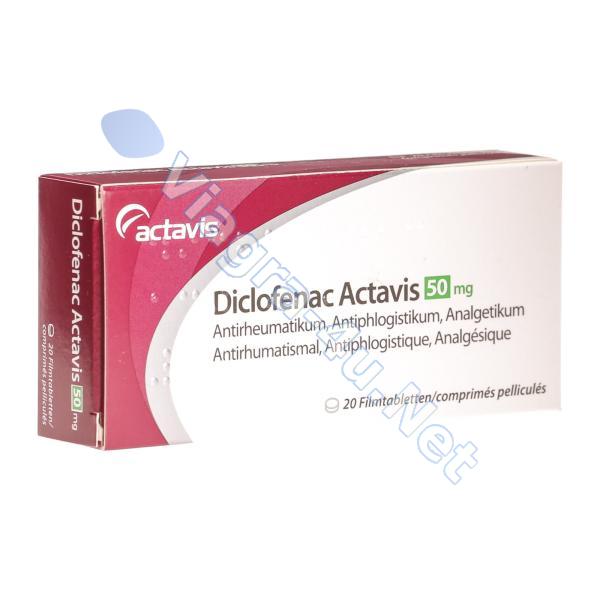

Diclofenac is used to treat symptoms of pain associated with rheumatoid arthritis, osteoarthritis, ankylosing spondylitis, dysmenorrhea, and mild-to-moderate pain. Diclofenac may be used alone or with other medications.
Diclofenac is used to treat symptoms of pain associated with rheumatoid arthritis, osteoarthritis, ankylosing spondylitis, dysmenorrhea, and mild-to-moderate pain. Diclofenac may be used alone or with other medications.
DICLOFENAC belongs to a class of drugs called Nonsteroidal Anti-inflammatory Drugs (NSAIDs).
Carefully consider the potential benefits and risks of DICLOFENAC and other treatment options before deciding to use the painkiller DICLOFENAC. Use the lowest effective dose for the shortest duration consistent with individual patient treatment goals.
After observing the response to initial therapy with DICLOFENAC, the dose and frequency should be adjusted to suit an individual patient’s needs.
For the relief of osteoarthritis, the recommended dosage is 100-150 mg/day in divided doses (50 mg twice a day or three times a day, or 75 mg twice a day).
For the relief of rheumatoid arthritis, the recommended dosage is 150-200 mg/day in divided doses (50 mg three times a day. or four times a day, or 75 mg twice a day.).
For the relief of ankylosing spondylitis, the recommended dosage is 100-125 mg/day, administered as 25 mg four times a day, with an extra 25-mg dose at bedtime if necessary.
Diclofenac has analgesic, anti-inflammatory, and antipyretic properties.
The mechanism of action of diclofenac sodium delayed-release, like that of other NSAIDs, is not completely understood but involves inhibition of cyclooxygenase (COX-1 and COX-2).
Diclofenac is a potent inhibitor of prostaglandin synthesis in vitro. Diclofenac concentrations reached during therapy have produced in vivo effects. Prostaglandins sensitize afferent nerves and potentiate the action of bradykinin in inducing pain in animal models. Prostaglandins are mediators of inflammation. Because diclofenac is an inhibitor of prostaglandin synthesis, its mode of action may be due to a decrease of prostaglandins in peripheral tissues.
Tell the doctor if you have any side effect that bothers you or that does not go away.
These are not all the possible side effects of Diclofencac. For more information, ask your doctor or pharmacist.
Before taking diclofenac, tell your doctor or pharmacist if you are allergic to it; or to aspirin or other NSAIDs (such as ibuprofen, naproxen, celecoxib); or if you have any other allergies. This product may contain inactive ingredients, which can cause allergic reactions or other problems. Talk to your pharmacist for more details.
Before using this medication, tell your doctor or pharmacist your medical history, especially of: asthma (including a history of worsening breathing after taking aspirin or other NSAIDs), bleeding or clotting problems, heart disease (such as previous heart attack), high blood pressure, liver disease, growths in the nose (nasal polyps), stomach/intestinal/esophagus problems (such as bleeding, ulcers, recurring heartburn), stroke.
Kidney problems can sometimes occur with the use of NSAID medications, including diclofenac. Problems are more likely to occur if you are dehydrated, have heart failure or kidney disease, are an older adult, or if you take certain medications (see also Drug Interactions section). Drink plenty of fluids as directed by your doctor to prevent dehydration and tell your doctor right away if you have a change in the amount of urine.
efore having surgery, tell your doctor or dentist about all the products you use (including prescription drugs, nonprescription drugs, and herbal products).
This drug may make you dizzy or drowsy. Alcohol or marijuana (cannabis) can make you more dizzy or drowsy. Do not drive, use machinery, or do anything that needs alertness until you can do it safely. Talk to your doctor if you are using marijuana (cannabis).
This medicine may cause stomach bleeding. Daily use of alcohol and tobacco, especially when combined with this medicine, may increase your risk for stomach bleeding. Limit alcohol and stop smoking. Consult your doctor or pharmacist for more information.
This medication may make you more sensitive to the sun. Limit your time in the sun. Avoid tanning booths and sunlamps. Use sunscreen and wear protective clothing when outdoors. Tell your doctor right away if you get sunburned or have skin blisters/redness.
Older adults may be at greater risk for stomach/intestinal bleeding, kidney problems, heart attack, and stroke while using this drug.
Before using this medication, women of childbearing age should talk with their doctor(s) about the benefits and risks (such as miscarriage, trouble getting pregnant). Tell your doctor if you are pregnant or if you plan to become pregnant.
During pregnancy, this medication should be used only when clearly needed. It is not recommended for use during the first and last trimesters of pregnancy due to possible harm to the unborn baby and interference with normal labor/delivery.
This drug passes into breast milk. While there have been no reports of harm to nursing infants, consult your doctor before breast-feeding.
Drug interactions may change how your medications work or increase your risk for serious side effects. This document does not contain all possible drug interactions. Keep a list of all the products you use (including prescription/nonprescription drugs and herbal products) and share it with your doctor and pharmacist. Do not start, stop, or change the dosage of any medicines without your doctor's approval.
Some products that may interact with this drug include: aliskiren, ACE inhibitors (such as captopril, lisinopril), angiotensin II receptor blockers (such as valsartan, losartan), corticosteroids (such as prednisone), cidofovir, lithium, methotrexate, "water pills" (diuretics such as furosemide).
This medication may increase the risk of bleeding when taken with other drugs that also may cause bleeding. Examples include anti-platelet drugs such as clopidogrel, "blood thinners" such as dabigatran/enoxaparin/warfarin, among others.
Check all prescription and nonprescription medicine labels carefully since many medications contain pain relievers/fever reducers (aspirin, NSAIDs such as celecoxib, ibuprofen, or ketorolac). These drugs are similar to diclofenac and may increase your risk of side effects if taken together. However, if your doctor has directed you to take low-dose aspirin to prevent heart attack or stroke (usually at dosages of 81-325 milligrams a day), you should continue taking the aspirin unless your doctor instructs you otherwise. Ask your doctor or pharmacist for more details.